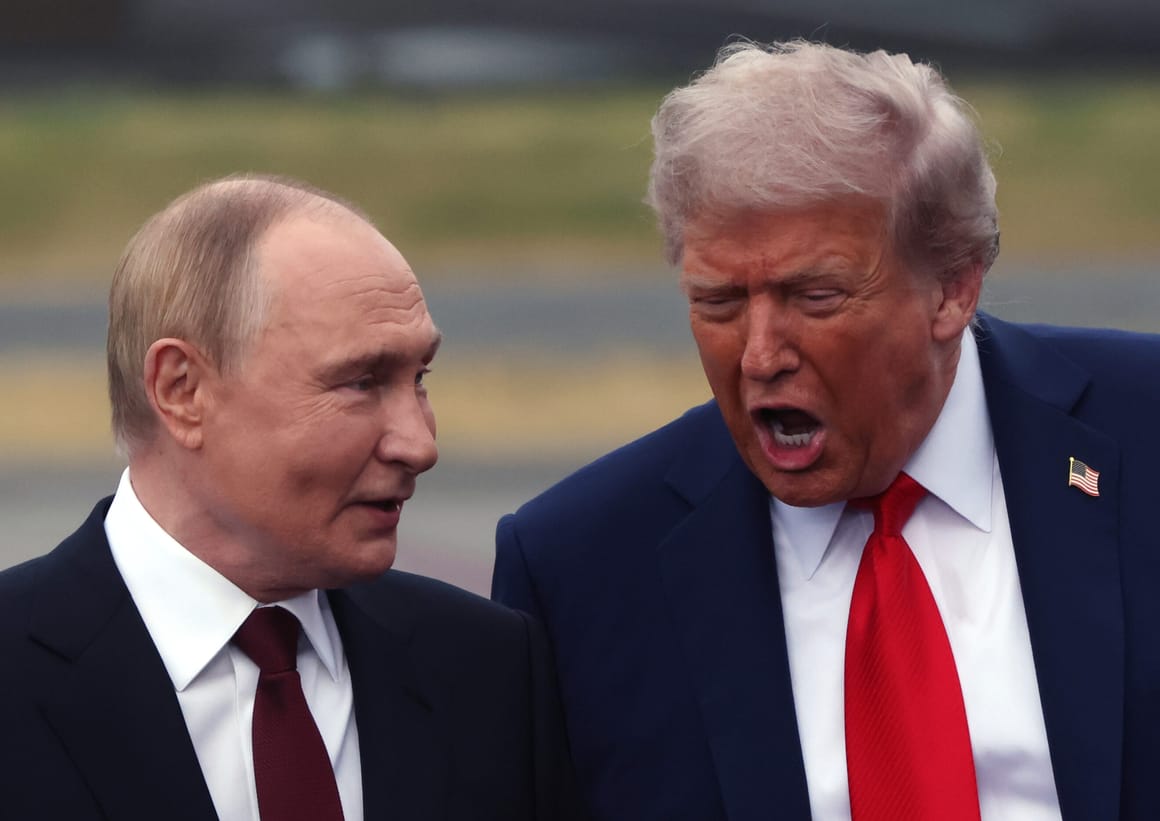Politics
European Leaders Seek to Leverage Trump’s Talks with Putin

European leaders are approaching the upcoming peace talks between Donald Trump and Vladimir Putin with skepticism, believing the Russian president is not genuinely seeking a resolution to the ongoing conflict in Ukraine. Their strategy focuses on supporting Trump while hoping he recognizes the need for a tougher stance against the Kremlin. This dual approach aims to call Putin’s bluff while simultaneously advocating for stronger sanctions against Russia.
Macron Voices Concerns Over Putin’s Intentions
The sentiment among European leaders is largely summarized by French President Emmanuel Macron, who has been a prominent figure in diplomatic efforts to prevent the war. Before his departure for Washington, Macron stated, “Do I think that President Putin wants peace? The answer is no. If you want my deepest belief: No. Do I think that President Trump wants peace? Yes.” He expressed deep concern that Putin’s true goal remains the destruction of an independent Ukraine.
Current negotiations indicate that Putin is not willing to make concessions. Instead, he continues to demand additional territory from Ukraine, including strategic defensive positions that would enable further military action. Additionally, Putin has rejected the presence of NATO forces as a security guarantee for Ukraine, a crucial demand from Kyiv. Amidst these developments, European leaders convened emergency talks to discuss their response, particularly in light of recent discussions in the White House.
According to five diplomats familiar with the meetings, there is a consensus that the Kremlin is unlikely to negotiate in good faith. However, there is optimism that Washington will impose punitive measures if Putin is identified as the primary obstacle to peace. One diplomat noted, “It’s clear that if we end up in a situation where Putin proves he doesn’t want to end the war, that will force Trump to act and it strengthens the case for sanctions.”
Sanctions and Security Guarantees Take Center Stage
European leaders view U.S. sanctions as pivotal in influencing the diplomatic landscape. Many believe that Putin’s engagement with Trump in Alaska was prompted by previous sanctions imposed by Washington on India over its dealings with Russian oil. A potential escalation of sanctions targeting Russia’s trade with China has also been discussed among European officials.
Leaders from various European nations, including Ursula von der Leyen, the President of the European Commission, and NATO Secretary General Mark Rutte, gathered in Washington to support Ukrainian President Volodymyr Zelenskyy in his discussions with Trump. This meeting followed Trump’s recent conversations with Putin, where he claimed progress had been made on “many points.”
Fiona Hill, a former adviser to Trump during his presidency, remarked, “This is a constant Trump management exercise for everyone — Putin included.” She acknowledged that while expectations were low, the outcome of the Alaska summit might offer a framework for future negotiations.
While publicly praising Trump for his role in facilitating the talks, European leaders are privately pushing for stricter economic measures should Russia refuse to negotiate in good faith. A fourth EU diplomat emphasized, “Everyone is going through the motions. But we don’t know what Putin’s end game is. What will motivate Putin to give any concessions? I don’t know.”
The pressure for peace talks is intensifying for Putin, with his responses to diplomatic overtures remaining vague. Russian Foreign Minister Sergey Lavrov stated that Moscow is not dismissing talks but insists that any summit must be prepared gradually. This approach has led to doubts about Russia’s commitment to genuine negotiations.
On the European side, diplomatic activity is accelerating. The EU held an extraordinary meeting of ambassadors, reflecting a sense of urgency in preparing for the upcoming negotiations. Expectations are growing that a concrete peace proposal could be presented to both Zelenskyy and Putin soon.
Trump has hinted that American air power could be utilized to support Ukraine, while European nations might consider troop deployments to safeguard the country. Such measures would directly challenge Russia’s territorial ambitions.
Despite the collaborative spirit among Western nations, there are concerns regarding the alignment of their positions. Following the discussions in Washington, the EU appeared to soften its demand for a ceasefire before negotiations, which raised apprehensions among some diplomats about the implications for future talks.
Most critically, Trump himself has acknowledged the possibility that Putin may not be negotiating in good faith. He stated, “We’re going to find out about President Putin in the next couple of weeks… It’s possible that he doesn’t want to make a deal.” The evolving dynamics of this situation will be closely monitored in the coming weeks as peace efforts continue.
-

 Health3 months ago
Health3 months agoNeurologist Warns Excessive Use of Supplements Can Harm Brain
-

 Health3 months ago
Health3 months agoFiona Phillips’ Husband Shares Heartfelt Update on Her Alzheimer’s Journey
-

 Science1 month ago
Science1 month agoBrian Cox Addresses Claims of Alien Probe in 3I/ATLAS Discovery
-

 Science1 month ago
Science1 month agoNASA Investigates Unusual Comet 3I/ATLAS; New Findings Emerge
-

 Science4 weeks ago
Science4 weeks agoScientists Examine 3I/ATLAS: Alien Artifact or Cosmic Oddity?
-

 Science4 weeks ago
Science4 weeks agoNASA Investigates Speedy Object 3I/ATLAS, Sparking Speculation
-

 Entertainment4 months ago
Entertainment4 months agoKerry Katona Discusses Future Baby Plans and Brian McFadden’s Wedding
-

 Entertainment4 months ago
Entertainment4 months agoEmmerdale Faces Tension as Dylan and April’s Lives Hang in the Balance
-

 World3 months ago
World3 months agoCole Palmer’s Cryptic Message to Kobbie Mainoo Following Loan Talks
-

 Science4 weeks ago
Science4 weeks agoNASA Scientists Explore Origins of 3I/ATLAS, a Fast-Moving Visitor
-

 Entertainment4 months ago
Entertainment4 months agoLove Island Star Toni Laite’s Mother Expresses Disappointment Over Coupling Decision
-

 Entertainment3 months ago
Entertainment3 months agoMajor Cast Changes at Coronation Street: Exits and Returns in 2025









